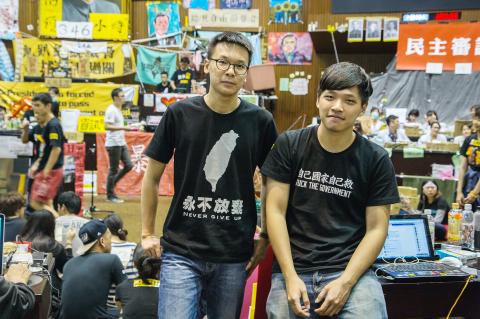Lin Fei-fan (林飛帆) and Chen Wei-ting (陳為廷), leaders of the ongoing student movement against the cross-strait service trade agreement, may face legal action for their involvement in the occupation by hundreds of students of the Legislative Yuan.
Local media reported yesterday that Lin and Chen have been referred by the police to the Taipei District Prosecutors’ Office for investigation on five charges: trespassing, interference with public functions, destruction of property, infringing on personal liberty and contempt of authority.
However, the office dismissed the report, saying that the pair had been accused by four anonymous individuals, not referred by the police.

Photo: Lam Yik Fei, Bloomberg
“The charges against the pair are being investigated,” the office said, adding that there were other people who had also filed lawsuits against the student activists and that their accusations would be handled according to the law.
As to when and whether Lin and Chen would be summoned for questioning, the office said: “The prosecutors responsible for the cases will make the decisions based on the progress of their investigations.”
However, sources familiar with the matter told the Chinese-language Liberty Times (the Taipei Times’ sister newspaper) that the office planned to question the pair after the Sunflower movement died down to avoid exciting the protesters inside and outside the Legislative Yuan.
So far, 43 people, including Lin and Chen, face legal action over their participation in the occupation of the legislature and the brief seizure of the Executive Yuan on Sunday last week, the sources said.
Lin and Chen said yesterday that they would take responsibility for their actions, but insisted that they are not guilty of any crimes.
“What we are doing is not illegal at all,” Chen told journalists in the legislative chamber. “But if prosecutors want to take any legal action against us, we will face it, shoulder it together and not try to dodge it.”
In related developments, an online petition launched on Tuesday by a group of 38 law professors that urges the Taipei District Prosecutors’ Office to investigate the government’s forced eviction of protesters from the Executive Yuan on Monday last week has attracted about 950 signatures.
The signatories include National Taiwan University (NTU) College of Law dean Shieh Ming-yan (謝銘洋), Fu Jen Catholic University School of Law dean Chang Yie-yun (張懿云) and National Taipei University Department of Law director Lin Kuo-bin (林國彬).
The petition makes three major demands: that prosecutors uncover the truth of what happened during the forced eviction of students; that all relevant evidence be carefully protected, including video footage from surveillance cameras around the Executive Yuan and the telephone records of senior government officials; and that prosecutors ascertain whether riot police attacked unarmed protesters with batons or overstepped their powers when trying to disperse them.
Riot police were caught on camera using force and water cannons to remove protesters from the Executive Yuan.
About 110 people were injured during the eviction process, including police officers and a lawmaker.
Additional reporting by Loa Iok-sin and Yang Kuo-wen

MAKING WAVES: China’s maritime militia could become a nontraditional threat in war, clogging up shipping lanes to prevent US or Japanese intervention, a report said About 1,900 Chinese ships flying flags of convenience and fishing vessels that participated in China’s military exercises around Taiwan last month and in January have been listed for monitoring, Coast Guard Administration (CGA) Deputy Director-General Hsieh Ching-chin (謝慶欽) said yesterday. Following amendments to the Commercial Port Act (商港法) and the Law of Ships (船舶法) last month, the CGA can designate possible berthing areas or deny ports of call for vessels suspected of loitering around areas where undersea cables can be accessed, Oceans Affairs Council Minister Kuan Bi-ling (管碧玲) said. The list of suspected ships, originally 300, had risen to about 1,900 as

Japan’s strategic alliance with the US would collapse if Tokyo were to turn away from a conflict in Taiwan, Japanese Prime Minister Sanae Takaichi said yesterday, but distanced herself from previous comments that suggested a possible military response in such an event. Takaichi expressed her latest views on a nationally broadcast TV program late on Monday, where an opposition party leader criticized her for igniting tensions with China with the earlier remarks. Ties between Japan and China have sunk to the worst level in years after Takaichi said in November that a hypothetical Chinese attack on Taiwan could bring about a Japanese

Right-wing political scientist Laura Fernandez on Sunday won Costa Rica’s presidential election by a landslide, after promising to crack down on rising violence linked to the cocaine trade. Fernandez’s nearest rival, economist Alvaro Ramos, conceded defeat as results showed the ruling party far exceeding the threshold of 40 percent needed to avoid a runoff. With 94 percent of polling stations counted, the political heir of outgoing Costa Rican President Rodrigo Chaves had captured 48.3 percent of the vote compared with Ramos’ 33.4 percent, the Supreme Electoral Tribunal said. As soon as the first results were announced, members of Fernandez’s Sovereign People’s Party

MORE RESPONSIBILITY: Draftees would be expected to fight alongside professional soldiers, likely requiring the transformation of some training brigades into combat units The armed forces are to start incorporating new conscripts into combined arms brigades this year to enhance combat readiness, the Executive Yuan’s latest policy report said. The new policy would affect Taiwanese men entering the military for their compulsory service, which was extended to one year under reforms by then-president Tsai Ing-wen (蔡英文) in 2022. The conscripts would be trained to operate machine guns, uncrewed aerial vehicles, anti-tank guided missile launchers and Stinger air defense systems, the report said, adding that the basic training would be lengthened to eight weeks. After basic training, conscripts would be sorted into infantry battalions that would take